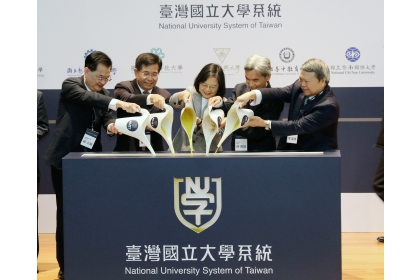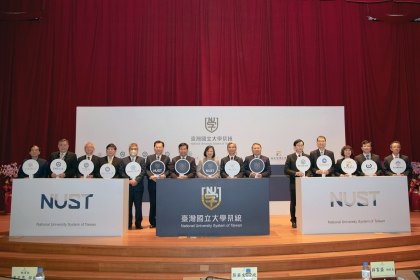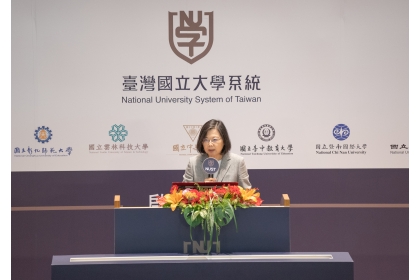National University System of Taiwan Is Launched to Integrate 11 University Resources
2021-11-08
興新聞張貼者
Unit秘書室
2,155
National University System of Taiwan (Referred to as NUST), which was formed by 11 national universities, held its launch ceremony on November 8. President Ing-Wen Tsai came to congratulate in person. System members include National Chung Hsing University, National United University, National Taiwan University of Sport, National Chin-Yi University of Technology, National Taichung University of Education, National Changhua University of Education, National Chi Nan University, National Yunlin University of Science and Technology, National Formosa University, National Chiayi University, National University of Kaohsiung, comprising higher education, technological and vocational education, education and sports systems. With more diversified characteristic resources, it is hoped to integrate the superior resources of each university through this platform to achieve sharing, co-prosperity, and common good.
"National University System of Taiwan" was approved by Ministry of Education in February this year (2021). It is currently the alliance with the largest number of members in the national university system. The first meeting of the system committee was convened in April, and Dr. Fuh-Sheng Shieu, President of National Chung Hsing University, was elected as the Chief President. Working circles such as teaching circle, research and development circle, international circle, and entrepreneurial circle were successively established. Through the deliberation and cooperation of each working circle, the implementation plan was drawn up, the future blueprint of the system jointly planned.
In her speech, President Ing-Wen Tsai said that the 11 national universities with their own characteristics and conscientious education, including more than 100,000 students, 3,600 professors, and 10,000 diversified courses, are currently the largest crossover and cross-domain platform in the history of higher education in Taiwan, and that it is believed that a new situation can be created for the higher education in Taiwan.
In his speech, Chief President Fuh-Sheng Shieu said that in coordination with the policy to develop Taiwan into a bilingual nation by 2030, NUST will be duty-bound to play an important role in promoting, and actively strive to establish an inter-university-level center with English as a medium of instruction (EMI) to effectively improve teachers' English teaching ability and students' English learning ability, to promote cooperation between higher education and the world.
In addition to actively participating in coordination with the national higher education policy, in order to enhance the competitiveness and energy of system members, various working circles are also actively planning various cooperation projects, including encouraging young scholars in the system to cooperate across universities, and looking forward to striving for large-scale integrated scientific research projects in the future, so as to strengthen cross-domain and cross-university research and development energy. In terms of courses, NUST will also promote the sharing of six major cooperative themed courses, so that students can select courses across universities. In respect of international cooperation, with the "International Loop Project" as the main axis, NUST, led by National Chung Hsing University, and International Cooperation and Development Fund will jointly cultivate international social service ambassadors, expand students' global vision, and fulfill university social responsibility.
"National University System of Taiwan" was approved by Ministry of Education in February this year (2021). It is currently the alliance with the largest number of members in the national university system. The first meeting of the system committee was convened in April, and Dr. Fuh-Sheng Shieu, President of National Chung Hsing University, was elected as the Chief President. Working circles such as teaching circle, research and development circle, international circle, and entrepreneurial circle were successively established. Through the deliberation and cooperation of each working circle, the implementation plan was drawn up, the future blueprint of the system jointly planned.
In her speech, President Ing-Wen Tsai said that the 11 national universities with their own characteristics and conscientious education, including more than 100,000 students, 3,600 professors, and 10,000 diversified courses, are currently the largest crossover and cross-domain platform in the history of higher education in Taiwan, and that it is believed that a new situation can be created for the higher education in Taiwan.
In his speech, Chief President Fuh-Sheng Shieu said that in coordination with the policy to develop Taiwan into a bilingual nation by 2030, NUST will be duty-bound to play an important role in promoting, and actively strive to establish an inter-university-level center with English as a medium of instruction (EMI) to effectively improve teachers' English teaching ability and students' English learning ability, to promote cooperation between higher education and the world.
In addition to actively participating in coordination with the national higher education policy, in order to enhance the competitiveness and energy of system members, various working circles are also actively planning various cooperation projects, including encouraging young scholars in the system to cooperate across universities, and looking forward to striving for large-scale integrated scientific research projects in the future, so as to strengthen cross-domain and cross-university research and development energy. In terms of courses, NUST will also promote the sharing of six major cooperative themed courses, so that students can select courses across universities. In respect of international cooperation, with the "International Loop Project" as the main axis, NUST, led by National Chung Hsing University, and International Cooperation and Development Fund will jointly cultivate international social service ambassadors, expand students' global vision, and fulfill university social responsibility.




